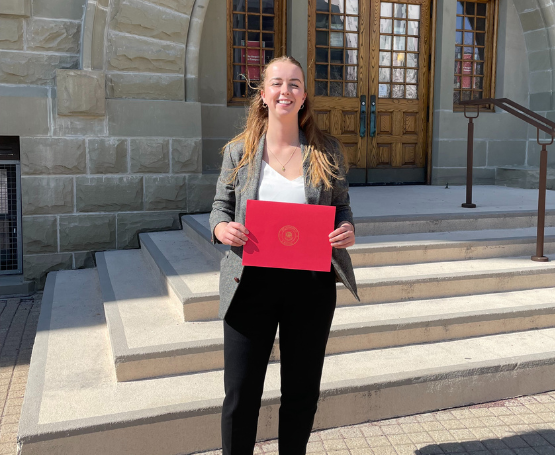Aug. 15, 2022
Masters student to study learning experiences of NICU nurses in providing end-of-life care

Shortly after Julia St. Louis graduated from nursing school in 2017 at the University of Alberta, she started working at the neonatal intensive care unit (NICU) of the British Columbia Children’s Hospital. Her first-hand experience caring for NICU babies prompted her masters research which explores learning experiences of NICU nurses in providing end-of-life care.
“I think what’s different or unique about dying in the NICU is that those patients are very unlikely to have ever left the hospital in their short lives,” says the UCalgary Nursing graduate student. “The only place they will ever live or be a person on this planet is in the NICU. I think that creates a heightened urgency for nurses and families in creating experiences where you can, like taking the baby out for a walk, helping parents give their babies a bath or putting them in an outfit.”
St. Louis explains that often babies who die in the NICU experience a pretty significant burden of disability such as being intubated and ventilated. “It is often the case that parents can't just go pick up their baby by themselves; a nurse needs to facilitate or help with pretty much any experience that baby's ever going to have.”
St. Louis says her experience learning how to care for children at their end of life was influenced by colleagues supporting her but noticed there was no systematic or formally structured way of how nurses were being taught to provide care to the families.
“In nursing, we tend to just learn the interpersonal skills on the job. There's always a structured way of teaching a physical skill like medication management for inserting an IV,” she says. “But it’s very well-documented, and there are many papers saying that the lack of education is a barrier to high quality palliative care in the NICU.”
She says while there is lack of formalized and structured teaching, “I’m still seeing my colleagues take incredible care of these families and babies. I think anyone would agree caring for families who are losing their baby is so important. And we shouldn't really be leaving it up to chance. That's what prompted my research.”
St. Louis’ thesis looks at how nurses gain these skills, with or without formalized education and teaching, and she hopes it will lay the groundwork for work she can pursue in a PhD. “Before you go and build a curriculum or develop some intervention, it's important to figure out how people are learning what they know right now.”

Julia St. Louis at 3MT regional competition in Winnipeg.
In the spring, St. Louis won the 2022 University of Calgary Three Minute Thesis with her 3MT talk “Learning Experiences of NICU Nurses in End-of-Life Care.” She then went on to compete against 16 other graduate students from universities in British Columbia, Alberta, Saskatchewan and Manitoba at the 2022 Western Canadian 3MT regional competition held in Winnipeg. She took home the People’s Choice Award for her presentation. This November, she will present as part of the National 3MT Showcase.
3MT is an annual research communication competition originally developed by the University of Queensland which challenges graduate students to communicate their research and its significance in three minutes or less for a general audience. At UCalgary, the competition is organized each year by the Faculty of Graduate Studies.
When asked why she thinks her research has resonated with so many audiences, St. Louis says: “obviously it's a heart-wrenching topic. When you can deliver a story, people connect to it. I also think that nursing research in general has that type of element to it. If you can tell a really human story with a clinical problem that you're hoping to fix, which is what a lot of nursing research is, I think people are drawn to that.”
This past spring, St. Louis received a Canada Graduate Scholarship from CIHR. She plans begin data collection this fall and start recruitment for her study which will reach nurses across the country.

